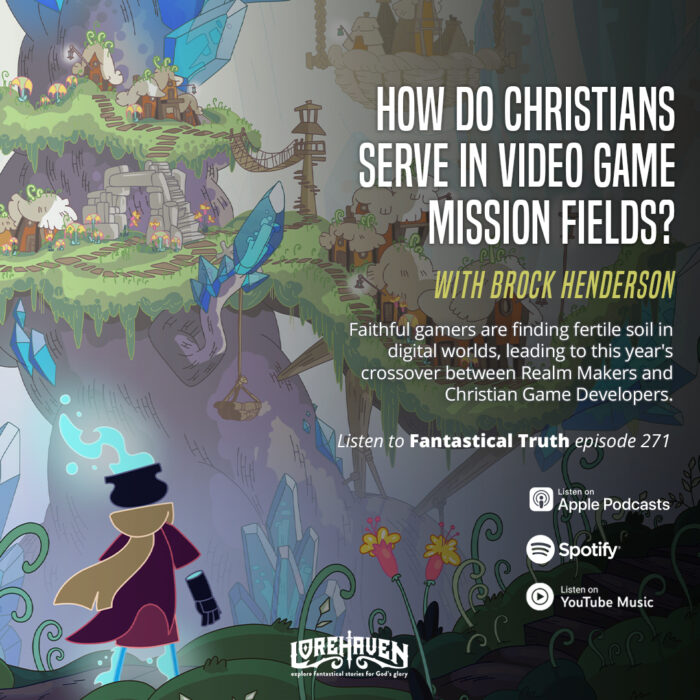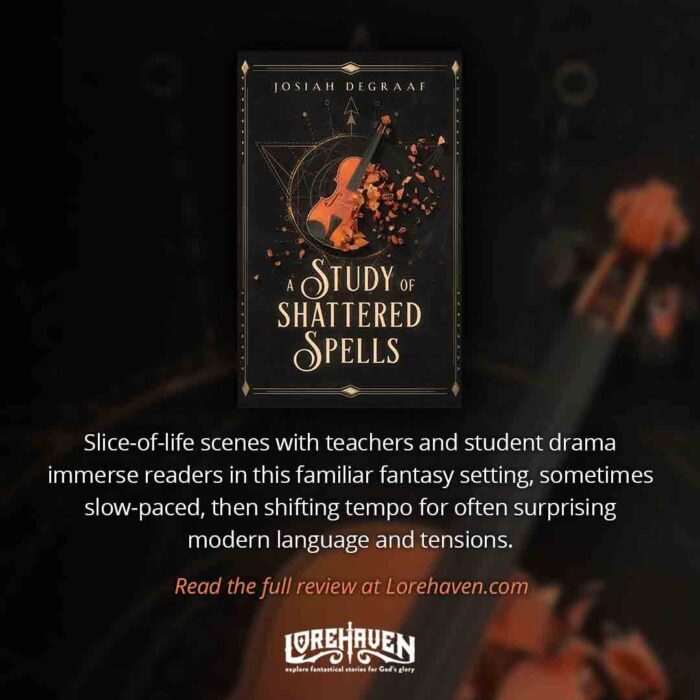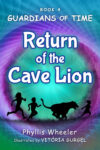209. How Can We Avoid Clichéd Criticism of Christian Fiction?
Podcast: Play in new window | Download (Duration: 1:05:29 — 61.3MB) | Embed
What comes to your mind with the label “Christian fiction”? If you grew up evangelical or heard the stereotypes, you likely think negative assumptions. For example, we assume “Christian fiction” has predictable plots, shallow characters, and cheap evangelism. Even when some stories do, how can we avoid our own cliched notions about all those “bad” Christian-made novels?
Episode sponsors
- Enclave Publishing: Lion Warrior by James R. Hannibal
- Changelings: Insurgence by Liam Corley
- Story Embers summit, May 23–25, 2024
 Mission update
Mission update
- Stephen announces his first novel, coming 2025 from Enclave Publishing
- Don’t miss Jenneth Dyck’s article about Prince Caspian onstage
- Last week’s review, Lion Warrior; this week’s review, Hybrid
- Subscribe free to get updates and join the Lorehaven Guild
Concession stand
- We’ve already covered cringe evangelical stuff and mention bad stories.
- Stephen even recently referenced a very bad evangelical novel by name.
- Other books, like The Shack, may be cringe but carry harmful ideas.
- And we know you may have only heard Christian fiction cheerleaders.
- But we’re not talking about that! We’re talking about cringe criticisms.
- Based on Stephen’s older article: How to Be A Silly Christian Fiction Critic.
- Per our emphasis here, Zack rightly suggested a more positive spin.
- Instead of an original “Seven ways to be a silly Christian fiction critic …”
- We’ll base this on seven ways to be a good Christian fiction critic.
1. Clear outdated nonsense and read today’s books.
- Even today I hear people assume Christian fiction is all Amish romance.
- And/or coloring books, Left Behind books, spiritual warfare, or angels.
- Apart from one exception, these are all previous evangelical trends.
- (And even those were better than today’s top evangelical trend: politics!)
- So know what you want to criticize before you venture to criticize it.
- That means more than a casual glance into your distant memory files.
- It means being aware of today’s novels beyond any briefly trendy titles.
- And it means seeking out the best acknowledged “small” or indie novels.
- Someone’s already being selected about the best ones, as we try to be.
2. Don’t compare fiction titles’ apples with oranges.
- Good critics know the purpose of a story beyond their own expectations.
- Stephen recalls Roger Ebert’s original bad take on Fellowship of the Ring.
- Ebert acknowledged he expected more walking, singing, and less action.
- Once he adjusted expectations, he liked the films for what they were.
- Similarly, don’t compare intentionally popular titles with Classical Works.
- E.g., whine that people aren’t reading enough Flannery O’Conner stories.
- That’s just silly at best, sinfully arrogant at worst. Folks have preferences.
- Christians may assume elitist notions that words are better than images.
- Or we assume one music genre is simply better than that music genre.
- That’s the assumption behind some of these false fiction comparisons.
- Practicing love for different people helps you appreciate their interests.
3. Recall how God used ‘bad’ stories to help you.
- Fans look back on cheap animation or B-movies with great fondness.
- They recognize their flaws, but appreciate these stories’ great attributes.
- So it is with “bad” Christian-made fiction (which may have its own goals).
- For instance, Left Behind author Jerry Jenkins wanted great accessibility.
- God used that series to get many, many fans interested in epic stories.
- Stephen is one. This podcast would not exist apart from Left Behind.
- Turns out the Holy Spirit can use “bad art” to help His people grow.
- Keep that truth in mind even if you see the real flaws in some stories.
4. Self-critique by challenging your expectations
- A lot of “Christian culture bad” random critiques offer no alternative.
- Meanwhile, even the “secular culture bad” critics are making new stuff.
- In other words, “don’t just curse the darkness, but light a candle.”
- What’s a critic’s alternative? What would change his/her mind about it?
- For example, what’s a ratio to switch “Christian fiction bad” to “… good?”
- E.g., twenty parts bad to one part good = all bad? What about a reverse?
- If there are but ten righteous in the city, shall we spare it from criticism?
- That goes double if we seem to be giving bad secular stories a pass.
- Meanwhile, do we accept the impulse to “punch church, coddle culture”?
5. Authors, don’t promote your stuff as The Solution
- Stephen doesn’t see this tendency as much as he used to see it.
- But occasionally you’ll find Christian creatives go back to this dry well.
- They’ll step on other “Christian fiction bad” and promote their own stuff.
- Some of that stuff may be okay, in which case the marketing is cringe.
- But other stuff overcorrects with bad words, grimdark, and immaturity.
- As we’ve said, there are no (and shouldn’t be) Chosen One authors.
- Far better to ignore the bad and train hard for Christ’s glory, not ours.
6. Finally, reject corny ‘the world is watching’ tropes
- There’s a frankly self-righteous meme-belief among Christians like this:
The world is watching. They see cheap stories, hypocrisy, too much politics. Therefore we as The Church must stop being so bad. Let’s make better art. Let’s stop being hypocrites. Let’s get out of politics. Only then will people see that we’re good people, not bad, and start being more curious about what Christianity is. The world is watching. Ah, let us perform for their praise.
- Okay, that last part might be a little snarky, but you get the point.
- Who’s missing from that line of thinking? Well, Jesus Christ, for One.
- Jesus promised that the world will hate Him and us (John 15:18).
- So even if I’m a cheap/bad/political Christian, I could just point to that.
- “The world is watching” is not enough. What does that even mean?
- I don’t trust “the world’s” judgment. They might be right or wrong.
- Sometimes it means, “Ugh, mom, you’re so embarrassing to me.”
- Well, your secondhand embarrassment is getting turned into legalism.
- To critique the Church and call for better art, you need better reasons.
- That’s why we prefer contending for better stories based on Scripture.
- God is our Creator. He sets creative standards, not worldly artists.
- Jesus is our Savior. He sets heroic examples, not church-hatewatchers.
- The Holy Spirit is our Sanctifier, and He makes us better, not silly critics.
Com station
Top question for you:
- What are your least and most favorite Christian-made novels?
Bob H has not encountered many Christians who scorn fiction:
My family were big readers, I got my love of sci-fi from my dad, and I don’t think I’ve ever encountered anyone in person who had anything to say against reading fiction. That seems a little bizarre to me: seems most likely to be internet virtue-signaling to impress a social media audience. For in-person discussions, I have more often encountered people who had a specific suspicion about a specific property (you know, Harry Potter promotes witchcraft kind of thing), and that’s usually a good-faith argument that’s worth an open-minded, thoughtful discussion.
Many fans, like JPC Writer, can’t wait to see “Caspian” onstage:
I spent an embarrassing amount of time daydreaming how I might get myself and my family to DC before their last show this month. Sadly, with all the parental health issues going on right now and my husband’s overtime, it’s probably not going to happen. But I’m so glad this type of thing is in the world (I had no idea that this theatre group existed) and do hope to see one of their productions either in person or a recorded version someday. Thanks so much for covering this in the podcast–I am looking forward to listening to the rest of the episode soon.
Next on Fantastical Truth
We’re partners with Realm Makers, the leading fantastical conference for Christian creatives. Recently they shared that over 40 percent of registrations for this July’s event are for first-time guests. This brings back memories! So we thought we’d share them with you. What’s it like at a writers’ conference? And what should first-time guests expect at Realm Makers and beyond?


































Share your thoughts about this podcast episode